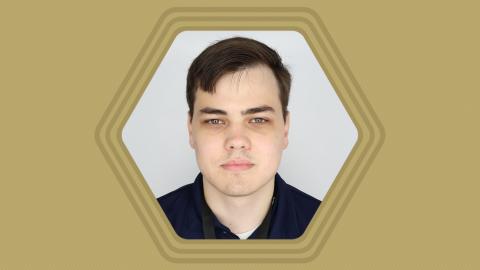The ECE Ph.D. candidate will use the support from the fellowship to continue his research on vanadium dioxide reconfigurable metasurfaces.
Georgia Tech School of Electrical and Computer Engineering (ECE) graduate researcher Walter Disharoon won the Haley P. Herbert Fellowship for his work on vanadium dioxide (VO2) reconfigurable metasurfaces.
The merit-based fellowship is given to exceptional graduate students in honor of College of Engineering graduate Herbert P. Haley (ME 1933).
VO2 is a phase change material that has the capability to change from behaving like an insulator to behaving like a conductor by applying temperature, electric field, or stress.
Disharoon’s research aims to harness the power of this material to improve modern high-speed communication systems that must deal with the large losses when transmitting at extremely high frequency such as millimeter wave (mmWave).
He also plans to demonstrate its protection capabilities as an energy selective surface. By selectively placing VO2, the surface allows low-power waves to transmit through unaffected while also being able to quickly transition to a conductive state and reject high-power waves.
This can help protect critical communication infrastructure from unintentional interference sources and malicious systems.
“I am happy to be selected for the fellowship as it continues to enable me to purse interesting research that has the potential to revolutionize communication systems and protect our critical infrastructure,” Disharoon said.
Disharoon was first introduced to Georgia Tech while he was getting his bachelor’s degree in electrical engineering from Kennesaw State University through a co-op he completed at the Georgia Tech Research Institute (GTRI).
Upon completing his undergraduate degree, he came to Georgia Tech where he is pursuing his ECE Ph.D., while working at the mmWave Antennas and Arrays Laboratory under the guidance of ECE Assistant Professor Nima Ghalichechian and GTRI chief scientist Joshua Kovitz.
During his time at Georgia Tech Disharoon has received support for his research from the Institute and beyond, including the ECE Freshmen Fellowship in 2021, a fellowship from Qualcomm in 2022, and the GTRI Graduate Student Fellowship in 2023.
He’s also served as a reviewer for the “IEEE Transactions on Antennas and Propagation” and the “Antennas and Wireless Propagation Letters” since 2022 and has coauthored two peer-reviewed journal articles and seven conference publications.
